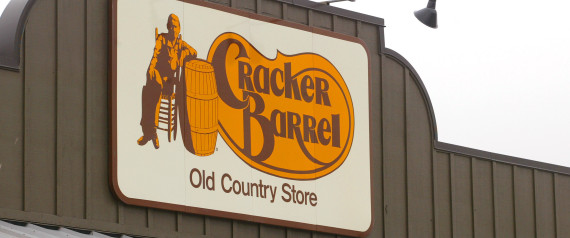In the early 90s, Southern restaurant chain Cracker Barrel drew
criticism from gay-rights activists for firing openly gay employees
under a policy that required workers to display “normal heterosexual
values which have been the foundation of families in our society.”
The company's policies largely reflected the times. Sodomy was still a
crime, and it was legal in many parts of the country -- and continues
to be today -- to fire someone based on their sexual orientation. But
experts say that Cracker Barrel's stance has evolved, a sign that the
movement's victories go beyond the big cities of the coasts and the
Midwest.
In an annual survey assessing corporate practices relevant to LGBT
employees published this week by Human Rights Campaign, Cracker Barrel
was given a score of 45 out of 100, a 10-point boost from the previous
year. The survey from the national gay rights group examines the largest
businesses in the United States, and gives a score based on a range of
practices, including drafting an anti-discrimination policy that
includes sexual orientation and gender identity, and creating LGBT
employee affinity groups.
According to the campaign's report, called the Corporate Equality
Index, this year corporations around the United States reached new
heights in their support of lesbian, gay, bisexual and transgender
workers; 304 businesses achieved a top rating of 100, more than any
previous year. In 2002, the first year the survey was conducted, just 13
companies achieved a perfect score. Most significantly, hundreds of
major businesses weighed in during 2013 on public policy decisions
either by signing an amicus brief urging the U.S. Supreme Court to
strike down the Defense of Marriage Act, or by joining a coalition of
companies publicly supporting an federal anti-gay workplace
discrimination bill.
Although companies like Texas-based Exxon Mobil -- where executives
have repeatedly ignored shareholder pressure to protect gay and lesbian
employees from discrimination -- and the Georgia fried-chicken chain
Chick-fil-A -- whose president stated that legalizing same-sex marriage
"invited God's judgement" -- continue to make headlines for their
opposition to gay rights, a slow, but steadily growing trend is
reshaping business practices across the South.
"This rising tide of LGBT corporate engagement has picked up
previously unlikely boats in the form of dozens of businesses across the
South and Midwest taking initial steps," HRC's report says.
Deena Fidas helps run the Corporate Equality Index, and often travels
to the South to help companies -- including Cracker Barrel -- seeking
to improve their ratings. She said she believes companies approach the
issue by assessing whether these changes improve their businesses,
instead of weighing moral or political values.
"When you strip away some of the language around social issues, you
see that where many Southern businesses have landed is a viewpoint,
backed up by their own policies and practices, that LGBT equality makes
the most sense for them as a business," she said.
Several Southern-based companies that have improved their scores in recent years confirm this attitude.
"Our mission is about pleasing people," said Terry Deas, Cracker
Barrel's director of diversity and outreach told The Huffington Post. In
2013, the company focused on adding LGBT content to its employee
training seminars, participating in local LGBT educational events, and
trying to recruit more LGBT employees and partner with LGBT-owned
companies. "It was all about living the mission of our company."
Deas declined to talk about the company's policies more than 20 years
ago when gay employees were fired if their sexual orientation was
revealed, because he said he has only been with the company for a year
and a half.
Darden Restaurants, a Florida-based restaurant company that owns
brands including Red Lobster and Olive Garden, received the full 100
points on the index last year for the first time. Darden executive Samir
Gupte said the improvements Darden has made in the last several years
were integral to the company's bottom line. "If we don't create an
environment where everyone can bring their true self to work, we're
going to miss engaging our employees, retaining the best people in the
business and then delivering a great guest experience," Gupte said.
The idea that businesses must be LGBT friendly to compete in the
global marketplace is as good a marker as any to measure the success of
the gay-rights movement, said Bob Witeck, a gay-rights advocate and
communications expert who specializes in working with corporations to
improve their policies.
"When I started about 20 year ago, companies saw this as far more
risk-far less reward. They thought they'd be giving up more than they'd
gain," he said. "Today that equation has flipped and clearly
corporations get it."
Although nearly all conservative Southern politicians remain set
against legalizing gay marriage, or protecting gay employees in the
workplace, Fidas said that in her work with Southern companies she does
see signs that voters are shifting faster than their elected officials.
At a recent training session in Atlanta on LGBT workplace diversity, she
asked the employees of various corporations in the audience to share
their earliest memories of learning about LGBT people. One woman shared
that her father was a Baptist minister and that as a little girl, she
and her friends were told that certain musicians and choir members in
the church were "like that" -- meaning gay.
"Her reference point was that they showed respect for gay people by
never acknowledging that they knew they were gay," Fidas said. "What I
think you're seeing is some workplaces' policies and benefits catching
up with these evolving understandings of the LGBT community and the fact
that these have always been our friends, our neighbors and family
members."


No comments:
Post a Comment